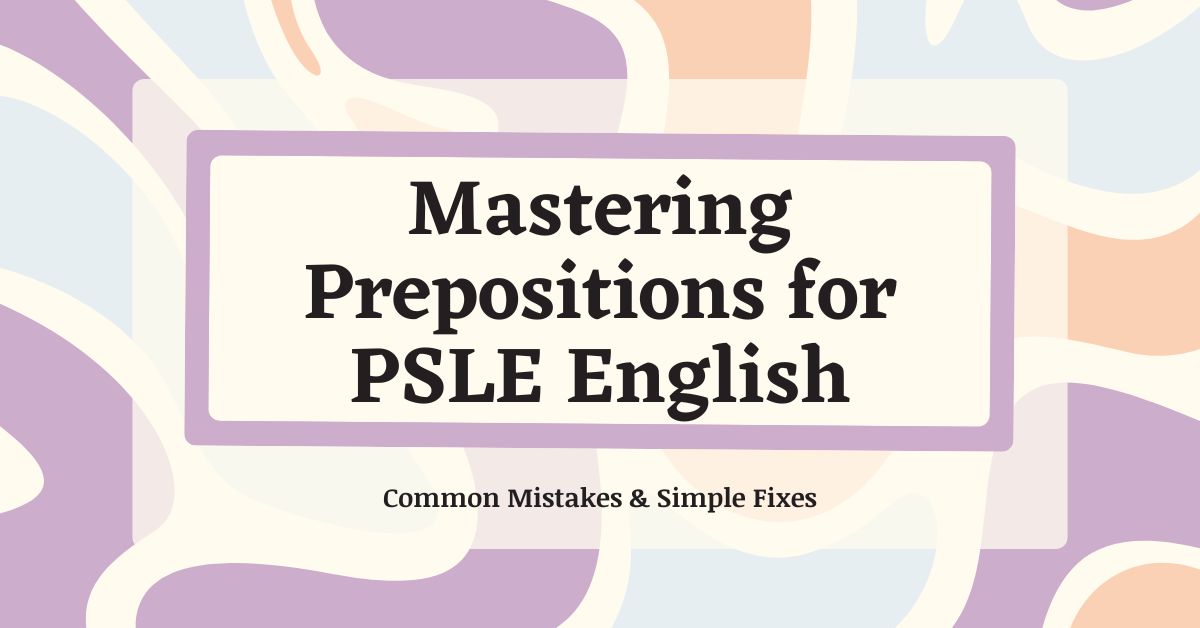Prepositions may seem small, but they carry significant weight in English grammar, especially in the PSLE. A misplaced “on,” “at,” or “to” can change the entire meaning of a sentence. For many students, prepositions are a standard stumbling block in both writing and grammar sections.
At Explico, we’ve helped hundreds of PSLE students gain confidence in grammar. In this blog, we break down the most frequent preposition mistakes and show you how to fix them—clearly and simply.
Why Prepositions Matter in PSLE English
Prepositions help show relationships between words in a sentence such as time, direction, place, cause, manner, and more. Mastery of prepositions is crucial for scoring well in composition writing and grammar MCQs.
Example:
❌ She is good in dancing.
✅ She is good at dancing.
Understanding these subtle differences can make or break your child’s grammar score.
Common Preposition Mistakes and How to Avoid Them
1. Using the Wrong Preposition After Certain Verbs
Some verbs require specific prepositions. Students often misuse them because they translate directly from how we speak or think in another language.
Mistake:
❌ She insisted for paying.
✅ She insisted on paying.
Tip:
Create a list of common verb-preposition pairs like:
- depend on
- believe in
- apologize for
2. Confusing “In” vs. “On” vs. “At” (Time & Place)
These three are the most misused prepositions, especially in PSLE grammar cloze passages.
Time Examples:
- At 5 p.m.
- On Monday
- In July
Place Examples:
- At the bus stop
- On the table
- In the room
Tip:
Use visuals or flashcards to help children differentiate between them quickly.
3. Redundant Prepositions
Some students add unnecessary prepositions, especially in formal writing.
Mistake:
❌ Where are you at?
✅ Where are you?
Tip:
Encourage students to read their writing aloud. If it sounds clunky, it might have extra words.
4. Ending Sentences with Prepositions (When Unnecessary)
While ending with a preposition is sometimes acceptable in casual writing, it’s best avoided in formal exams like the PSLE.
Mistake:
❌ This is the pencil I wrote with.
✅ This is the pencil with which I wrote.
Tip:
Teach alternatives for sentence restructuring in formal compositions.
5. Using “To” Instead of “For” (and Vice Versa)
This mistake happens when expressing reason or benefit.
Mistake:
❌ I bought a gift to my friend.
✅ I bought a gift for my friend.
Tip:
Remember:
- Give something to someone
- Do something for someone
How to Help Your Child Master Prepositions
Practice with Real Exam Questions:
Use PSLE-style worksheets to get used to how prepositions appear in context.
Watch Videos or Animated Lessons:
Many children learn better visually. Explico’s online platform offers engaging explainer videos for tricky grammar topics.
Get Instant Feedback:
With Explico’s AI-powered assessments, your child gets immediate corrections and guidance.
Daily Preposition Drills:
A 5-minute daily practice can drastically improve your child’s grammar instinct.
Final Thoughts
Prepositions can be tricky, but with the right strategies and consistent practice, PSLE students can master them. Understanding how and when to use the right preposition boosts not just grammar marks but also confidence in writing and communication.
At Explico, we make English grammar easy and enjoyable through our expert tutors, interactive lessons, and personalised feedback.
Struggling with grammar? Let Explico help.
Sign up for a free trial class and see how our smart learning platform can transform your child’s PSLE preparation.
👉 Visit Explico.sg


